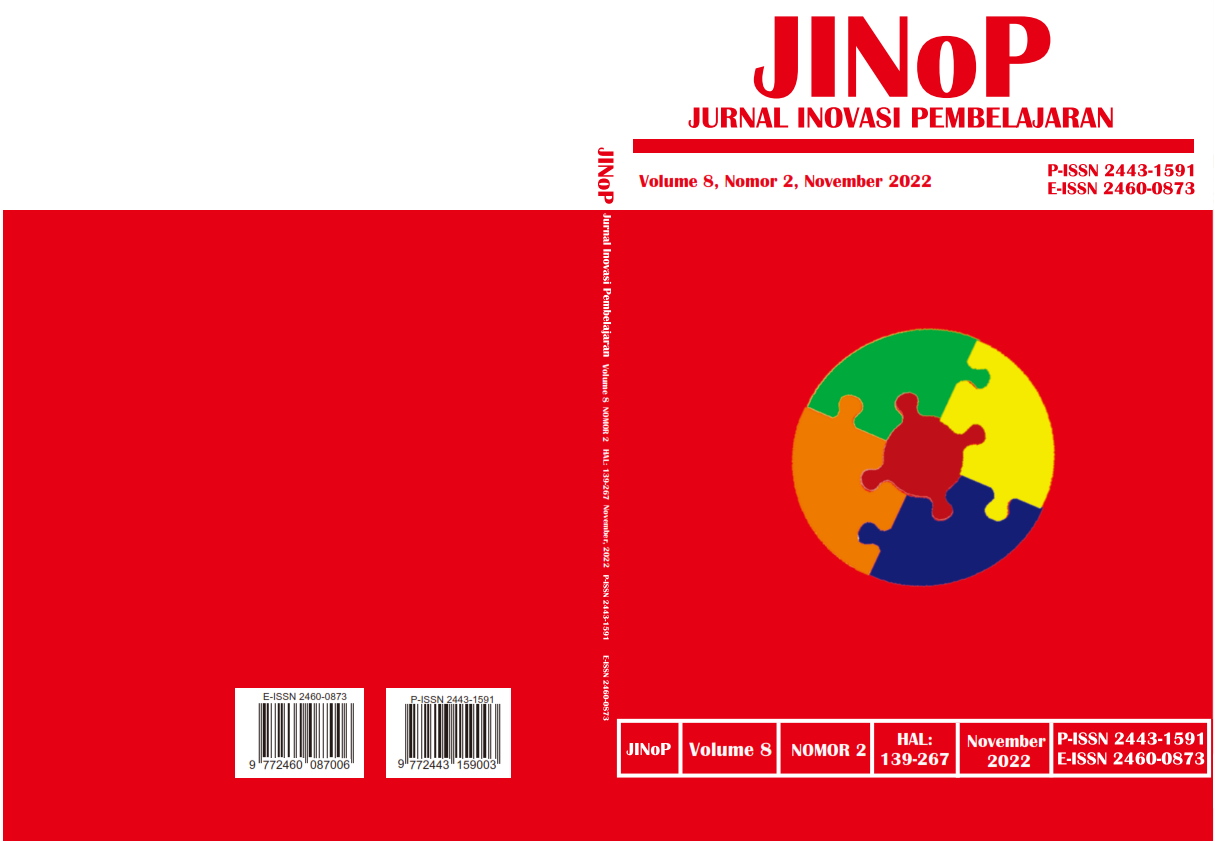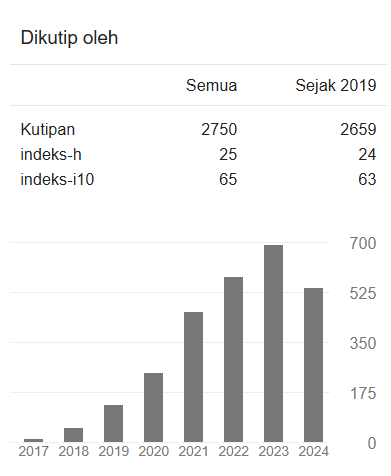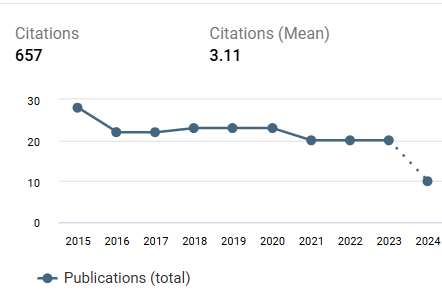Integrasi Polysynchronous Learning dengan Problem Based Learning untuk Meningkatkan Keterampilan Metakognitif
DOI:
https://doi.org/10.22219/jinop.v8i2.15065Keywords:
polysynchronous learning, problem based learning, metakognitifAbstract
Aspek pendidikan mengalami perubahan dan penyesuaian terhadap penyelenggaraan proses pembelajaran sebagai akibat dari adanya pandemi covid-19. Berdasarkan hasil observasi dan wawancara kegiatan pembelajaran blended learning menunjukkan adanya beberapa kendala : 1) kegiatan pembelajaran blended learning yang dilaksanakan tidak student center, 2) proses pembelajaran dirasa monoton, 3) kompetensi mahasiswa terutama pada kemampuna keterampilan berpikir kritis dan metakognitif tidak terasah dengan baik. Berdasarkan hal tersebut maka perlu dilakukan penelitian integrasi polysynchronous learning dengan problem based learning untuk mengukur keterampilan metakognitif mahasiswa. Jenis penelitian ini merupakan Quasy Eksperimen dengan menggunakan pendekatan penelitian kuantitatif, sedangkan desain penelitian yang digunakan yakni non-equivalent pre-test post-test control group desain. Hasil penelitian juga menunjukkan bahwa pembelajaran polysynchronous learning dengan problem based learning dapat mengembangkan kemampuan berpikir kritis dan metakognitif mahasiswa dengan sangat baik pada MK Zoologi dan MK Anfiswanman.Downloads
References
Afifi, R., Hindriana, A., & Soetisna, U. (2016). Implementasi Project Based Learning Berbasis Praktikum Terhadap Keterampilan Dan Kesadaran Metakognitif Mahasiswa Calon Guru Biologi (Project Based Learning Methode Based Practice Implementation to Prospective Biology Teachers Metacognitive Skills and Met. Bioedusiana, 4(2), 29–45. https://doi.org/10.34289/277900
Aswadi, R., Fadiawati, N., & Abdurrahman. (2016). Meningkatkan Kemampuan Metakognisi Siswa Pada Pembelajaran Fisika Menggunakan Lembar Kerja Siswa Berbasis Inkuiri Terbimbing. Jurnal Inovasi Dan Pembelajaran Fisika, (1), 43–54. Retrieved from https://ejournal.unsri.ac.id/index.php/jipf/article/view/5458/313
Amrulloh, A., & Ardhi, M. W. (2017). Identifikasi kemampuan metakognisi pada mata kuliah biologi sel mahasiswa program studi pendidikan biologi. Prosiding Seminar Nasional SIMBIOSIS II, 104–113. http://prosiding.unipma.ac.id/index.php/simbiosis/article/view/325
Ardila, C., Corebima, A. D., & Zubaidah, S. (2013). Hubungan keterampilan metakognitif terhadap hasil belajar Biologi dan retensi siswa kelas X dengan penerapan strategi pemberdayaan berpikir melalui pertanyaan (PBMP) di SMAN 9 Malang. Jurnal Pendidikan: Teori, Penelitian, Dan Pengembangan, 1–9. http://jurnal-online.um.ac.id/data/artikel/artikelEE88BC4B01504CB71615F1D280FAF7AE.pdf
Arend, B. (2009). Encouraging critical thinking in online threaded discussions. The Journal of Education Online, 6(1): 1-23. https://www.thejeo.com/
Corebima, A. D. (2016). Pembelajaran biologi di Indonesia bukan untuk hidup. Seminar Nasional XIII Biologi, Sains, Lingkungan, Dan Pembelajarannya Di Pendidikan Biologi FKIP UNS, 13(1), 8–22. https://jurnal.uns.ac.id/prosbi/article/viewFile/5640/5008
Cucinotta, D., & Vanelli, M. (2020). WHO declares COVID-19 a pandemic. Acta Bio- Medica : Atenei Parmensis, 91(1), 157–160. https://doi.org/10.23750/abm.v91i1.9397
Iskandar, S. M. (2014). Pendekatan Keterampilan Metakognitif Dalam Pembelajaran Sains Di Kelas. Erudio Journal of Educational Innovation, 2(2), 13–20. https://doi.org/10.18551/erudio.2-2.3
Kalaga, A. J., & Setiawan, D. (2018). Penerapan Model Pembelajaran Group Investigation Untuk Meningkatkan Keterampilan Metakognitif Siswa Kelasvii Smp Negeri 4 Lamboya. Edubiotik : Jurnal Pendidikan, Biologi Dan Terapan, 2(02), 1–6. https://doi.org/10.33503/ebio.v2i02.124
Lestari, W., Pratama, L. D., & Jailani, J. (2019). Metacognitive Skills in Mathematics Problem Solving. Jurnal Daya Matematis, 6(3), 286. https://doi.org/10.26858/jds.v6i3.8537
Lloyd-Sherlock, P. G., Kalache, A., McKee, M., Derbyshire, J., Geffen, L., Casas, F. G.- O., & Gutierrez, L. M. (2020). WHO must prioritise the needs of older people in its response to the covid-19 pandemic. BMJ (Clinical Research Ed.), 368(m1164), 1. https://doi.org/10.1136/bmj.m1164
Mahase, E. (2020). Covid-19: WHO declares pandemic because of “alarming levels” of spread, severity, and inaction. BMJ (Clinical Research Ed.), 368(m1036), 1. https://doi.org/10.1136/bmj.m1036
Mbipom, B., Craw, S., & Massie, S. (2018). Improving e-learning recommendation by using background knowledge. Expert Systems, November 2017, e12265. https://doi.org/10.1111/exsy.12265
Mhouti, A. El, Nasseh, A., Erradi, M., & Vasquèz, J. M. (2017). Enhancing collaborative learning in Web 2.0-based e-learning systems: A design framework for building collaborative e-learning contents. Education and Information Technologies, 22(5), 2351–2364. https://doi.org/10.1007/s10639-016-9545-2
Mas’ud, M., Ahmad, A., & Arsyad, N. (2018). The Development of Metacognitive Skills-Based Teaching Materials. Journal of Education and Learning (EduLearn), 12(4), 731. https://doi.org/10.11591/edulearn.v12i4.8215
Mirabolghasemi, M., Choshaly, S. H., & Iahad, N. A. (2019). Using the HOT-fit model to predict the determinants of E-learning readiness in higher education: a developing Country’s perspective. Education and Information Technologies, 24(6), 3555– 3576. https://doi.org/10.1007/s10639-019-09945-9
Muna, K., Sanjaya, R. E., Syahmani, & Bakti, I. (2017). Metacognitive skills and students’ motivation toward chemical equilibrium problem solving ability: A correlational study on students of XI IPA SMAN 2 Banjarmasin. AIP Conference Proceedings, 1911. https://doi.org/10.1063/1.5016001
Nugraini, S. H., Choo, K. A., Hin, H. S., & Hoon, T. S. (2013). Impact of e-av biology website for learning about renewable energy. TOJET: The Turkish Online Journal of Educational Technology, 12(2), 376–386. http://www.tojet.net/
Permana, F.H., & Setyawan, D. (2022). Pengaruh polysynchronous learning berbasis problem based learning untuk meningkatkan hasil belajar praktikum. Edukatif: Jurnal Ilmu Pendidikan, 4(3). https://doi.org/10.31004/edukatif.v4i3.2854
Permana, F.H., Hi.Padu, H., & Susetyarini, R.E. (2022). The effect of problem-based learning integrated individual rotation route on islamic character and critical thinking ability. Biosfer: Jurnal Pendidikan Biologi, 15(2), 255-262. https://doi.org/10.21009/biosferjpb.26219
Perdih, M. R. M. (2016). Developing guidelines for evaluating the adaptation of accessible web-based learning materials. International Review of Research in Open and Distance Learning, 17(4), 166–181. https://doi.org/10.19173/irrodl.v17i4.2463
Pavlidis, P. (2011). Critical thinking as dialectics: a hegelian-marxist approach. Journal forCritical Education Policy Studies, 8(2): 74-102. http://www.jceps.com/archives/644
Fitri, N., Mawardi, M., & Kurniawan, R. A. (2017). Korelasi Antara Keterampilan Metakognisi Dengan Aktivitas Dan Hasil Belajar Siswa Pada Mata Pelajaran Kimia Kelas X Mia Sma Negeri 7 Pontianak. AR-RAZI Jurnal Ilmiah, 5(1), 81–92. https://doi.org/10.29406/arz.v5i1.655
Siregar, I. Y., Susilo, H., & Suwono, H. (2017). The Effect of Think-Pair-Share-Write Based on Hybrid Learning on Metakognitive Skills, Creative Thinking and Cognitive Learning at SMA Negeri 3 Malang. Jurnal Pendidikan Biologi Indonesia, 3(2), 183. https://doi.org/10.22219/jpbi.v3i2.4217.
Sohrabi, C., Alsafi, Z., Neill, N. O., Khan, M., Kerwan, A., Al-jabir, A., … Agha, R. (2020). World Health Organization declares global emergency: A review of the 2019 novel coronavirus (COVID-19). International Journal of Surgery, 76, 71–76. https://doi.org/10.1016/j.ijsu.2020.02.034
Wahdah, N. F., Jufri, A. W., & Lalu, Z. (2016). Jurnal belajar sebagai sarana pengembangan kemampuan metakognisi siswa. Jurnal Pijar MIPA, XI(1), 70–74. https://doi.org/10.14800/ics.95
Wicaksono, C. A. G. (2014). Hubungan Keterampilan Metakognitif dan Berpikir Kritis terhadap Hasil Belajar Kognitif Siswa SMA pada Pembelajaran Biologi dengan Strategi Reciprocal Teaching. Jurnal Pendidikan Sains, 2(2), 85–92. Retrieved from http://journal.um.ac.id/index.php/jps/
Watkins, J. (2020). Preventing a covid-19 pandemic. The BMJ, 368(February), 1–2. https://doi.org/10.1136/bmj.m810
Yuwono, C. S. M. (2014). Peningkatan Keterampilan Metakognisi Siswa dengan Pembelajaran Kooperatif Jigsaw-Modifikasi. Jurnal Santiaji Pendidikan, 4(1), 1–21. Retrieved from http://jurnal.unmas.ac.id/index.php/JSP/article/view/51
Zulfiani, Z., Herlanti, Y., Rosydatun, E. S., Hasiani, S., Rohmatulloh, G., & Zuqistya, N. (2018). Developing metacognitive skill instrument on fungus concept. EDUSAINS, 10(2), 243–253. https://doi.org/10.15408/es.v10i2.7919
Downloads
Published
How to Cite
Issue
Section
License
Copyright (c) 2022 Permana et al

This work is licensed under a Creative Commons Attribution 4.0 International License.
Copyright Notice
Authors who publish with JINoP (Jurnal Inoasi Pembelajaran) agree to the following terms:
- For all articles published in the JINoP (Jurnal Inovasi Pembelajaran), copyright is retained by the authors. Authors give permission to the publisher to announce the work with conditions. When the manuscript is accepted for publication, the authors agree to the automatic transfer of the publishing right to the publisher.
- Authors retain copyright and grant the journal the right of first publication with the work simultaneously licensed under a Creative Commons Attribution 4.0 International License. that allows others to share the work with an acknowledgment of the work's authorship and initial publication in this journal.
- Authors are able to enter into separate, additional contractual arrangements for the non-exclusive distribution of the journal's published version of the work (e.g., post it to an institutional repository or publish it in a book), with an acknowledgment of its initial publication in this journal.
- Authors are permitted and encouraged to post their work online (e.g., in institutional repositories or on their website) prior to and during the submission process, as it can lead to productive exchanges, as well as earlier and greater citation of published work (See The Effect of Open Access).








